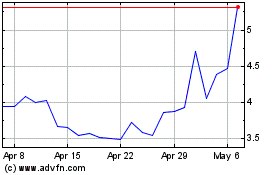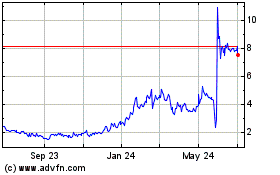Summit Therapeutics plc (‘Summit’ or the
‘Company’)
Summit Announces Publication of Phase 2 Clinical Analyses of
Gut Microbiome Health
Oxford, UK, and Cambridge, MA, US, July 13,
2020 – Summit Therapeutics plc (NASDAQ: SMMT) today announces
the publication of data from the Phase 2 clinical trial of the
company’s precision antibiotic, ridinilazole, in development for
the treatment of C. difficile infection (‘CDI’) in the American
Journal of Physiology – Gastrointestinal and Liver Physiology. The
data published in collaboration with researchers at Tufts
University and Tufts Medical Center demonstrated that
ridinilazole’s microbiome preservation resulted in a gut
environment expected to inhibit the growth of C. difficile. In
contrast, vancomycin treatment resulted in a gut environment that
may more highly favor the growth of C. difficile. The difference in
gut environment could explain the approximately 60% relative
reduction in recurrence observed in patients treated with
ridinilazole over vancomycin in the Phase 2 trial.
“This is the first scientific article ever to
show the effect of antibiotics treating CDI on the bile acid
composition in the human gut. In addition, CoDIFy is the first
clinical study to highlight the differential effects of antibiotics
on bile acids, which are known to create environments that can
either promote or protect against CDI,” said Dr. Ventzislav
Stefanov, Executive Vice President and President of Discuva.
“The protective gut environment observed after ridinilazole
treatment, compared to vancomycin, provides a strong rationale for
the higher sustained clinical response observed in patients taking
ridinilazole in the CoDIFy clinical trial.”
The Phase 2 clinical trial enrolled 100
patients, half of whom received ridinilazole and the other half
vancomycin. The publication, “Ridinilazole, a narrow spectrum
antibiotic for treatment of Clostridioides difficile infection,
enhances preservation of microbiota-dependent bile acids,” was
authored by X. Qian, K. Yanagi, A. Kane, N. Alden, M. Lei, D.
Snydman, R. Vickers, K. Lee and C. Thorpe. In the published data,
there was a higher ratio of pro-C. difficile to anti C.-difficile
bile acids at the start of treatment for both ridinilazole- and
vancomycin-treated patients. This was expected, as patients who get
CDI have perturbed microbiomes. However, during treatment, patients
treated with vancomycin showed a further decrease in anti-C.
difficile bile acids and had stools dominated by pro-C. difficile
bile acids. In contrast, this did not occur in ridinilazole-treated
patients. By the end of the study period, ridinilazole-treated
patients’ bile acid ratios trended towards a healthy, non-CDI
state. These results support the data from the Phase 2 clinical
trial, in which patients receiving ridinilazole showed a
statistically significant improvement in sustained clinical
responses.
About C. difficile
InfectionClostridioides difficile, or C. difficile, infection
(CDI) is a bacterial infection of the colon that produces toxins
causing inflammation of the colon and severe diarrhea. CDI can also
result in more serious disease complications, including
pseudomembranous colitis, bowel perforation, toxic megacolon and
sepsis. CDI represents a serious healthcare issue in hospitals,
long-term care homes and in the wider community. Summit estimates
there are over one million cases of CDI each year in the United
States and Europe, based on an epidemiology report on CDI that was
published in 2015 by Decision Resources, a healthcare research and
consulting company. Recurrence rates of up to 25% have been
reported following treatment with the current standard of care,
vancomycin. The vicious cycle of recurrence continues further, with
patients who have one recurrence being at increased risk for
another. The Healthcare Cost and Utilization Project, a family of
databases developed through a federal-state-industry partnership,
sponsored by the Agency for Healthcare Research and Quality of the
US Department of Health and Human Services, reported an approximate
3.5-fold increase in hospital stays associated with CDI between
2000 and 2008. The economic impact of CDI is significant. A study
published in 2016 in BMC Infectious Diseases estimated that the
total costs attributable to the management of CDI were
approximately $6.3 billion per year.
About RidinilazoleRidinilazole is an
investigational oral small molecule new mechanism antibiotic that
is designed to selectively kill C. difficile, thereby preserving
patients’ protective gut microbiome and leading to sustained CDI
cures. In a Phase 2 proof of concept trial in CDI patients,
ridinilazole showed statistical superiority in sustained clinical
response ('SCR') rates compared to vancomycin. In that trial, SCR
was defined as clinical cure at end of treatment and no recurrence
of CDI within 30 days of the end of therapy. Ridinilazole was also
shown to be highly preserving of the gut microbiome in the Phase 2
proof of concept trial. The gut microbiome is known to be important
in protecting against CDI. Ridinilazole has received Qualified
Infectious Disease Product ('QIDP') designation and has been
granted Fast Track designation by the US Food and Drug
Administration. The QIDP incentives are provided through the US
GAIN Act and include a potential extension of marketing exclusivity
for an additional five years upon FDA approval.
About Bile AcidsBile acids are produced in the liver and
secreted into the gastrointestinal (GI) tract to aid in the
digestion of dietary fats and lipids. They appear as a variety of
forms including conjugated primary bile acids, primary bile acids
and secondary bile acids. The levels of different bile acids can
play a direct role in C. difficile infection, primary bile acids
are known to promote the germination of C. difficile spores, whilst
secondary bile acids prevent germination of spores and inhibit the
growth of vegetative C. difficile cells. A healthy individual
might be expected to have low levels of primary bile acids and high
levels of protective secondary bile acids in their lower GI
tract.
About Summit Therapeutics Summit
Therapeutics, led by its Discuva Platform, the Company's discovery
engine, is a leader in antibiotic innovation. Our new mechanism
antibiotics are designed to become the patient-friendly new era
standard of care for those suffering from infectious disease,
subject to regulatory approvals, and create value for payors and
healthcare providers. In the present time, we are developing new
mechanism antibiotics to treat infections caused by C. difficile,
Enterobacteriaceae and N. gonorrhoeae and are using our proprietary
Discuva Platform to expand our pipeline. For more information,
visit www.summitplc.com and follow us on Twitter @summitplc. For
more information on the Company's Discuva Platform, visit
https://www.summitplc,com/our-science/discuva-platform.
Contacts
|
Summit Press Office |
investors@summitplc.com |
|
Summit Forward-looking Statements
Any statements in this press release about the
Company’s future expectations, plans and prospects, including but
not limited to, statements about the clinical and preclinical
development of the Company’s product candidates, the therapeutic
potential of the Company’s product candidates, the potential
commercialization of the Company’s product candidates, the
sufficiency of the Company’s cash resources, the timing of
initiation, completion and availability of data from clinical
trials, the potential submission of applications for marketing
approvals and other statements containing the words "anticipate,"
"believe," "continue," "could," "estimate," "expect," "intend,"
"may," "plan," "potential," "predict," "project," "should,"
"target," "would," and similar expressions, constitute
forward-looking statements within the meaning of The Private
Securities Litigation Reform Act of 1995. Actual results may differ
materially from those indicated by such forward-looking statements
as a result of various important factors, including: the
uncertainties inherent in the initiation of future clinical trials,
availability and timing of data from ongoing and future clinical
trials and the results of such trials, whether preliminary results
from a clinical trial will be predictive of the final results of
that trial or whether results of early clinical trials or
preclinical studies will be indicative of the results of later
clinical trials, expectations for regulatory approvals, laws and
regulations affecting government contracts and funding awards,
availability of funding sufficient for the Company’s foreseeable
and unforeseeable operating expenses and capital expenditure
requirements and other factors discussed in the "Risk Factors"
section of filings that the Company makes with the Securities and
Exchange Commission, including the Company’s Transition Report on
Form 20-F for the eleven months ended 31 December 2019.
Accordingly, readers should not place undue reliance on
forward-looking statements or information. In addition, any
forward-looking statements included in this press release represent
the Company’s views only as of the date of this release and should
not be relied upon as representing the Company’s views as of any
subsequent date. The Company specifically disclaims any obligation
to update any forward-looking statements included in this press
release.
-END-
Summit Therapeutics (NASDAQ:SMMT)
Historical Stock Chart
From Mar 2024 to Apr 2024

Summit Therapeutics (NASDAQ:SMMT)
Historical Stock Chart
From Apr 2023 to Apr 2024
